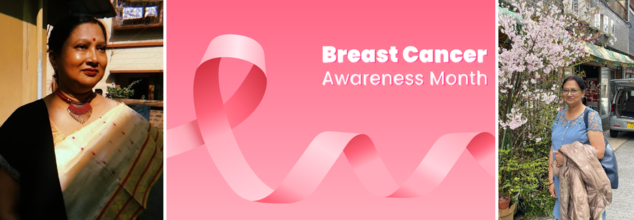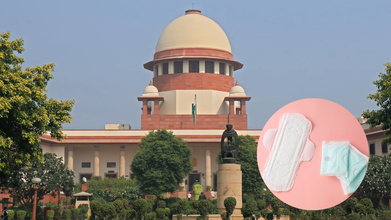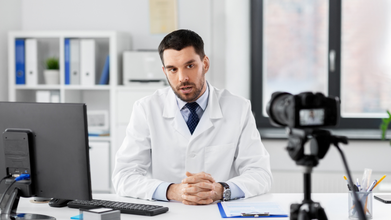- Health Conditions A-Z
- Health & Wellness
- Nutrition
- Fitness
- Health News
- Ayurveda
- Videos
- Medicine A-Z
- Parenting
I Survived: 'Women Are Not Taught To Touch Themselves...How Will They Know If They Have Breast Cancer?'

Every year in October, we observe breast cancer awareness month and for the longest, to me, it was just an important health month to spread awareness about it. However, things changed for me, and it changed twice.
"It Is Just A Lump"
The first time my life changed was back in June 2018, when my mother, a resident of Delhi, Dilshad Garden to be specific, 48 years old, discovered a lump in the left side of her chest. This is when I was just about to start my bachelor's from the University of Delhi. As excited as I was to live the university life, there was a lingering anxiety.
My mother, while resting one day, felt something on her chest. She tried to feel it, but could not. No one teaches women to touch themselves. It is still a taboo, and remains so when campaigns around breast cancers call breasts everything else, but what it really is - breasts!
This was also when my father was not in town, she called him and shared what she just found in her chest. He suggested to go see a gynaecologist. My mother went to someone she trusted, a gynaecologist, even I know of. The doctor asked her to get a breast X-ray, however, it had no clear results.
After a medical examination, the doctor asked her to get a mammography done and suggested that she see a different doctor, but did not tell her who to consult. My mother was confused, "I did not even know it could be something serious, I thought it's just a lump," she said as she narrated the story to me.
"I went to Savita Vihar because there was no imaging lab that had mammography services around our house," my mother told me. However, the mammography results were also not clear. "It was clear that lump existed, but no one was ready to tell me if it was cancerous. Then I was suggested to get a fine needle aspiration (FNA) done," she explained.
As fancy as it sounds, the procedure is not so fancy. FNA is done using a thin needle and syringe to extract fluid from a suspicious area of the body and is then diagnosed to rule out any cancerous condition. "We got this done in Preet Vihar because that was the only nearby place where FNA was performed. When we got the reports, it had numbers, but no one told us what it was. The guy who handed the reports came out with a long sad face. Even though we did not know if it was cancer, his expressions were enough of a hint," she said.
With the reports, my mother and my father went to a family doctor, a general surgeon of a nursing home in Laxmi Nagar, which now remains closed. This was though far from our house; it was close to Preet Vihar, where she had gotten her FNA. The doctor suggested that she get her lump removed. "This is when your dad asked him if he should take me to a hospital to an oncologist because we were doubting if it was cancerous. But the doctor said there was no need and that it would take us ages to get one appointment with a doctor in big hospitals, so we just got it removed. We sent it for biopsy at two different imaging labs," she recalled.
The "C" Word
The reports came out from both the labs, and there it was. My mother had Stage 1 breast cancer, but was not told, till after her first surgery. She then finally went to Max Hospital in Vaishali and consulted an oncologist. "The doctor there said that I would be put on medications, but that would be enough, I was happy that there won't be any surgeries," she said.
However, life had other plans. Her new doctor also suggested that she get her lump sample transferred to Max Hospital from the previous imaging labs for another biopsy. "After the biopsy at Max Hospital, I was told that there were cells which could still be active around the area of my left breast where the lump was found. The doctor said that if we hadn't removed the lump, then they could've performed a comprehensive test around the area on my breast where the lump was detected to see whether cells were multiplying. If they were, they would have taken care of that in just one surgery. However, the only way to know now whether any cells are multiplying is through another surgery," she explained.
This was an axillary lymph node dissection (ALND), where a lymph node from her armpit was to be removed and sent for biopsy in the middle of surgery. If it came positive then the nodes would be removed from her armpit, if it came out negative, then the area would be stitched, with just one of the tested samples of lymph nodes removed.
While the tests were negative, which meant no cells were active, this surgery made her weak. She could not lift her left arm and had numbness around her left hand for more than one year.
Cancer Never Truly Goes Away
Even though she was cancer-free, she was now suggested radiation therapy. "It was a difficult time because it was painful and it felt like my body was burning. I smelled like burnt flesh. I would feel really hot even when the AC was on," she said.
She was then prescribed medicines that lowered her estrogen levels. These medicines were called "life-saving drugs" and were prescribed to her for 5 years. I remember getting these medicines every three months from a CGHS-designated medical dispensary, near RK Ashram Marg at subsidised rates because otherwise they were very costly.
The medicines lowered her estrogen levels because estrogen stimulates hormone receptor-positive breast cancers to grow, lowering the estrogen level can help slow the cancer's growth or help prevent it from coming back. However, this did not sit well with her menstrual cycle.
Due to low estrogen levels, her periods became irregular, however, it did not ring any bell because she was anyway nearing her menopausal age. Upon one of the regular checkups, it was found that her uterus which was supposed to be 3 inches long, 2 inches wide and 1 inch thick, grew 6 times its original size. "This happened because low levels of estrogen messed up my periods and instead of bleeding out, all the blood was collected inside my uterus. The doctor suggested that I get a uterus cleaning done every month, or get it removed. To me, removal sounded more feasible than to visit the hospital every month," she explained.
After my mother got her uterus removed, she bled uncontrollably and had to be operated again. This led to two abdominal operations on the same day, creating a lump or swelling near the site of the scar. This later led to a hernia, leading to another operation. Meanwhile, she was still on her medications, and it was slowly affecting her memory, she started to forget things.
Sometimes I would come back from college in the afternoon and she would open the door and go back to sleep and would forget in the evening that I was home. She would wake up in shock seeing me at home, asking when I came. It was a difficult time. I had never seen my mother like this. She was always smart and had the best memory. She was like our Google map before it was even a thing. Now she could not remember if her daughter was back home.
These medicines had other side effects too, like weak bones, lack of calcium, high blood pressure and other hormonal imbalances. Due to her hernia, her spermatic veins also swelled and caused varicose veins.
However, like any other phase, this too had to pass and it did. After 5 years of continuous pain, weaknesses, surgeries, and all of us trying to be there for her, in April 2023, after all her tests were done, she was finally off her "life-saving drugs". She will soon turn 55, and is living her life, travelling between India and Japan, with the three kids she loves the most, which includes not my sister and I, but a rabbit, and two Indies that our family adopted!
The Second Time My Life Changed
Hearing her narrate her story changed my life because, before today, I did not know that she was misled till she had her first surgery. I did not know that the stigma around breast cancer was so strong that not only did people not mention it, but medical professionals too did not guide her. Maybe there would have been one less surgery or maybe her hand wouldn't have gone numb for one whole year had she been guided and her diagnosis been done right.
Touch Yourself!
One thing she told my sister and me is what she learned from her radiologist at Max Hospital. "When she asked me how I got to know about the lump, I told her I just randomly noticed one day. She asked me, 'Randomly? Do you not check yourself?' I told her that nobody checks themselves, women are not taught to do it. How will they know they have breast cancer? There should be more awareness and people should come out to talk about it."
This is not a remote area where people are not aware. This is the capital city. Still, due to a lack of awareness, there was a delay and ambiguity that guided my mother's diagnosis of breast cancer. This is why, breast cancer awareness month for me, is the utmost important period to spread awareness.
To All The Women:
Her radiologist's advice was: If you are a menstruator, check your breasts and armpits for any lumps on every 3rd day of your period.
If you have hit your menopause, then select any date of a month and check your breasts on that date every month.
A Child Dies Every Nine Minutes in India From Drug Resistance, Data Shows

Credit: Canva
One child in India dies every nine minutes from an infection caused by antibiotic-resistant bacteria, as it becomes one of the top 10 global public health threats, experts warn.
Dr HB Veena Kumari of the Department of Neuromicrobiology, National Institute of Mental Health and Neurosciences, claims: "The Covid-19 pandemic has significantly contributed to rising antimicrobial resistance. The World Health Organisation projects that 10 million deaths will occur annually by 2025."
According to the National Foundation for Infectious Diseases, antibiotic resistance occurs when bacteria in the body learns to withstand and remain unaffected by the medicines (antibiotics) meant to kill them.
In such cases, doctors have to switch to different antibiotics, but these backup medicines might not work as well or might cause more side effects. Additionally, infections may also worsen over time as bacteria can become resistant to all available drugs.
Alarmingly is that these tough, drug-resistant bacteria can spread from one person to another, both in hospitals and at home.
According to Dr TS Balganesh, Gangagen Biotechnologies, nearly 36 percent of haemodialysis patients die from fatal infections, which is second only to cardiovascular diseases as a cause of death.
He tells Deccan Herald: "The risk for infective endocarditis in haemodialysis patients is approximately 18 times higher than in the general population and up to 58 percent of these episodes are caused by a bacteria named 'S aureus', with an in-hospital mortality of more than 50 percent."
What Does WHO Say?
One out of every six serious infections confirmed in labs worldwide last year could not be killed by the antibiotics meant to treat them.
Between 2018 and 2023, the problem of antibiotics failing (called resistance) got much worse. For many common types of germs, resistance went up by 5% to 15% every year. The growing inability of these essential medicines to work is a huge threat to people everywhere.
Which Antibiotics Are People Becoming Resistant To?
The WHO's latest report is the most detailed look yet at this issue. It reports on how much resistance exists across 22 different antibiotics, which include common drugs used to treat everyday illnesses. The report focused on eight common types of bacteria that cause things like:
- Urinary tract infections (UTIs)
- Stomach and intestinal infections
- Dangerous blood infections
- Gonorrhoea
Additionally, Dr Obaidur Rahman of Dr Ram Manohar Lohia Hospital has also warned that the country’s casual use of Azithromycin, sold under brand names such as Zithromax, Azee and Zmax, has worsened its effectiveness and pushed India closer to a major public health challenge.
A drug often prescribed for sore throats and upper respiratory tract infections, Dr Rahman noted that Azithromycin was once effective against Mycoplasma Pneumonia, a bacterium responsible for pneumonia in adults and children.
READ MORE: India’s New Antibiotic in 30 Years Offers Hope Against Antibacterial-Resistant Infections
However, this is no longer the case as India now shows an alarming 80 to 90 percent resistance to the drug when treating infections caused by this bacterium. A medicine that once addressed a wide range of respiratory problems is no longer reliable for many patients.
The surgeon has since urged people to avoid taking antibiotics without proper medical advice. Most seasonal respiratory infections resolve on their own, and unnecessary drugs only add to the resistance problem.
Supreme Court Declares Menstrual Hygiene As Part Of Right To Life; Free Sanitary Pads For Girls In All Schools

Credits: Britannica and Canva
Supreme Court on Friday declared the right to menstrual health as part of the right to life under Article 21 of the Constitution. The court issued a slew of directions to ensure that every school provides biodegradable sanitary napkins free of cost to adolescent girls. The guidelines also ensured that schools must be equipped with functional and hygienic gender-segregated toilets. The Court directed the pan-India implementation of the Union's national policy, 'Menstrual Hygiene Policy for School-going Girls' in schools for adolescent girl children from Classes 6-12.
Read: Menopause Clinics Explained: Latest Launch By Maharashtra And Kerala Government
Supreme Court Declares Menstrual Hygiene As Part Of Right To Life: Here Are the Directions
A bench comprising Justice JB Pardiwala and Justice R Mahadevan passed the following directions:
- All States/UT must ensure that every school, whether government-run or privately managed, in both urban and rural areas, is provided with functional gender segregated toilets with usable water connectivity.
- All existing or newly constructed toilets in schools shall be designed, constructed and maintained to ensure privacy and accessibility, including by catering to needs of children with disabilities.
- All school toilets must be equipped with functional washing facilities and soap and water available at all times.
- All states/UTs must ensure that every school, whether government-run or privately managed, in both urban and rural areas, provide oxo-biodegradable sanitary napkins manufactured in compliance with the ASTM D-6954 standards free of cost. Such sanitary napkins must be made readily accessible to girl students, preferably within toilet premises through sanitary napkin vending machines or, where not visible, at a designated place.
- All States/UTs must ensure that every school, whether government-run or privately managed, in both urban and rural areas establish menstrual hygiene management corners. It must be equipped with spare innerwears, uniforms, disposable pads and other necessary materials to address menstrual urgency.
The court also issued directions for the disposal of sanitary waste. Justice Pardiwala said, "This pronouncement is not just for stakeholders of the legal system. It is also meant for classrooms where girls hesitate to ask for help. It is for teachers who want to help but are restrained due to a lack of resources. And it is for parents who may not realise the impact of their silence and for society to establish its progress as a measure in how we protect the most vulnerable. We wish to communicate to every girlchild who may have become a victim of absenteeism because her body was perceived as a burden when the fault is not hers."
Read: Menstrual Cups To Replace Sanitary Napkins In Karnataka Government Schools
Why Is This Judgment So Important?
In India, menstruation is still seen as taboo. In fact, there is a lot of shame around it. Menstrual shame is the deeply internalized stigma, embarrassment, and negative perception surrounding menstruation, which causes individuals to feel unclean, or "less than" for a natural biological process. This judgment thus is an effort to do away with the shame rooted in cultural, social, and religious taboos, which is often the reason why many girls drop out, or due to lack of awareness, develop health adversities.
Most Medical Videos Even By Doctors Online Are Factually Incorrect, Finds Study

Representational Image by iStock
Most health videos on YouTube, even those made by doctors are also not reliable medical information, found a new study, published in JAMA Network Open. The researchers reviewed 309 popular YouTube videos on cancer and diabetes and found that fewer than 1 in 5 were supported by high quality scientific evidence. About two-thirds of the view had low, very low or no evidence at all to back up their health claims.
What was more concerning is that weaker evidence often attracted more viewer than those backed with strong science. The study looked at videos which had at least 10,000 views. The lead author of the study Dr EunKyo Kang of South Korea's National Cancer Center, said, "This reveals a substantial credibility-evidence gap in medical content videos, where physician authority frequently legitimizes claims lacking robust empirical support."
"Our findings underscore the necessity for evidence-based content-creation guidelines, enhanced science communication training for health care professionals, and algorithmic reforms prioritizing scientific rigor alongside engagement metrics," Kang added in a news release.
How Was The Study Conducted?
The researchers reviewed videos from June 20 and 21, 2025, focusing on cancer and diabetes content. 75 per cent of them were made by physicians. The videos had a median count of 164,000 views and a median length of 19 minutes.
Researchers also developed a scoring system, called E-GRADE to rate the strength of science backed evidence in each video's claim.
This is how the grading system worked:
- GRADE A: high quality evidence
- GRADE B: standard quality evidence
- GRADE C: low quality evidence
- GRADE D: very low or no evidence
What Were The Results Of The Medical Videos?
- GRADE A: 19.7%
- GRABE B: 14.6%
- GRADE C: 3.2%
- GRADE D: 62.5%
The study also found that videos with the weakest evidence were 35% more likely to get higher views than videos with strong scientific evidence.
Richard Saver, a professor of law at the University of North Carolina at Chapel Hill noted that this issue is not just limited to YouTube. "Physician-spread misinformation is a long-standing problem, dating back well before the internet era," he wrote in an accompanying editorial.
Saver said some doctors continue to lean on personal experience rather than solid data, despite evidence-based medicine being regarded as the gold standard. He noted that EBM can feel like it downplays individual clinical judgment. Still, Saver stressed that more research is needed, adding that the study underscores the importance of examining the evidence behind health professionals’ claims on social media.
How Health And Me Has Helped With Medical Facts
Health and Me has always stayed a step ahead from medical misinformation and ensured that its readers too consume correct information. Health and Me's Fact Check series have consistently ran checks on bizarre medical claims, whether it is about a magical potion for weight loss, fake health news, or un-scientific remedies.
Fact Check By Health And Me:
- Fact Check: Does Circumcision Really Cause Autism As Claimed By RFK Jr.?
- Fact Check: Semen Production Means You Have Healthy Sperms, Here's What The Doctor Says
- Fact Check: Is The COVID-19 'Lab Leak' Theory Correct?
- Fact Check: Are Fewer Childhood Vaccines Really “A Better Thing” Under the New CDC Guidelines?
- Fact Check: Is Weight Lifting Safe for Teens? An Expert Explains the Risks and Safer Alternatives
- Fact Check: Do Heart Attacks Peak in the Early Morning? Here’s What a Doctor Says
- Fact Check: Does Ja Morant Have Lung Cancer?
- Fact Check: Can Cold Morning Showers Trigger Brain Stroke?
- Fact Check: Is The Pink Salt Trick Recipe Effective For Weight Loss?
© 2024 Bennett, Coleman & Company Limited

